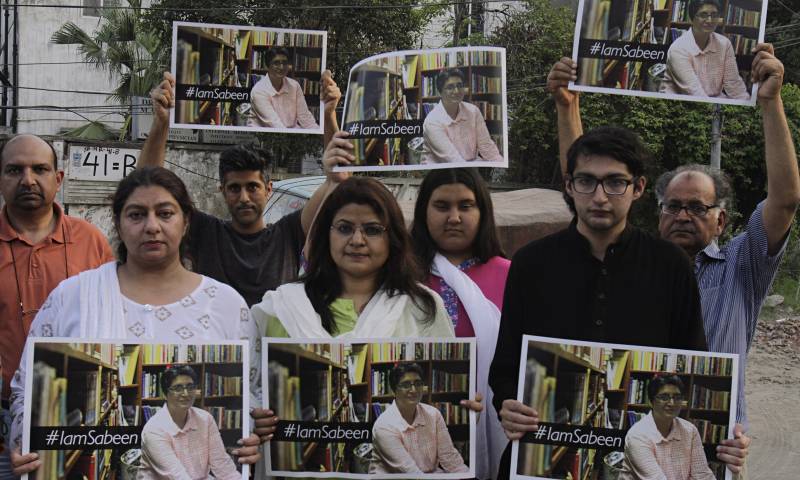Sabeen Mehmud’s death, a despicable and cowardly act, has quickly been turned into an unjustifiable social debate.
Without going into the causes of her death, the incident is being used to justify terrorism in Balochistan and to glorify terrorist outfits responsible for killing innocent people, including labourers, teachers and children.
Balochistan is not “silenced” as claimed by civil society groups. Chief Minister Dr Abdul Malik Baloch, himself a Baloch nationalist, speaks openly for Balochistan’s rights. In a recent seminar at the literary festival in Islamabad, for example, he said that his government had been empowered to negotiate any deal for the Reko Diq project.
Fortunately, civil society and social media stalwarts cannot alone speak for Balochistan to champion the province’s rights. The people of Balochistan have the right to speak on behalf of the province, just as they spoke when they bravely came out on May 11, 2013 to vote for their representatives giving them the monopoly to articulate the case for their province.
Most members of civil society members clamouring the rights of Balochistan by holding candle-light vigils, have never been to Balochistan in their lives. They do not understand the dynamics of the province, its porous borders with Afghanistan, with Iran and the short distance into the Persian Gulf which makes the province a hotbed for all kinds of shadowy networks that extend from drug trafficking to the regional and international rival agencies’ proxy games. The terrorist outfits provide a perfect front for these networks to help keep Balochistan boiling at low intensity so as to prevent the development of its sea line and its natural resources which would benefit its people.
We should not forget that Balochistan is a conflict-ridden region and because of its geo-strategic position, it has been and is likely to remain a landscape for local and external terrorism.
There are genuine grievances coming out of Balochistan, i.e. that the 18th amendment has not been fully implemented; that there is no Baloch in grade 21 out of 50 plus federal bureaucrats etc. But KP also nurses similar complaints, and so does Sindh. Will their residents be justified in taking up arms, resorting to violence and playing into regional proxy wars? Now matter how understandable the goal, the means do not justify the ends.
Outfits involved in terrorism treat every Baloch and Pashtun of Balochistan as a traitor and a legitimate target to be killed. Young politicians like Habib Jalib Baloch and Raziq Bugti were killed because they were moderate Baloch leaders.
Is not civil society complicit with these terrorists when they speak of unsilencing Balochistan? When they build the narrative around a wounded Baloch militant, an angry lot that has no choice but to be violent?
Does civil society want to see Balochistan continuously stagger in the dark because of the glorification of its terrorists and the undermining of the moderate Baloch leadership who as true federalists are standing with Pakistan at great peril to their lives?
Since the school attack in Peshawar late last year, Pakistan has been transformed. Its civilian and military leadership now has zero tolerance for terrorism. Zero tolerance is a goalpost that cannot be realised if we condone one type of terrorism and abhor another.
Pakistan is perhaps the only country in the Islamic world that has stood its ground in the face of centrifugal forces mainly due to its armed forces who have underpinned the territorial integrity of the country and its stability.
Sabeen Mahmud’s murder has been used to malign Pakistan’s army and its intelligence agencies on assumptions. Nasty comments by some members of civil society are actually, inadvertently doing the job for the enemies of Pakistan.
Friday, April 19, 2024
Balochistan not silenced

Parvez Elahi’s indictment delayed again in two cases
April 19, 2024
SC suspends ECP’s re-polling order in PP-51
April 19, 2024
Court approves plea bargain of Parvez Elahi’s co-accused
April 19, 2024
Zardari creates another parliamentary record
April 19, 2024
KP politicians, civil society laud President’s address
April 19, 2024
A Tense Neighbourhood
April 19, 2024
Dubai Underwater
April 19, 2024
X Debate Continues
April 19, 2024
Hepatitis Challenge
April 18, 2024
IMF Predictions
April 18, 2024
Kite tragedy
April 19, 2024
Discipline dilemma
April 19, 2024
Urgent plea
April 19, 2024
Justice denied
April 18, 2024
AI dilemmas unveiled
April 18, 2024
ePaper - Nawaiwaqt
Advertisement
Nawaiwaqt Group | Copyright © 2024





